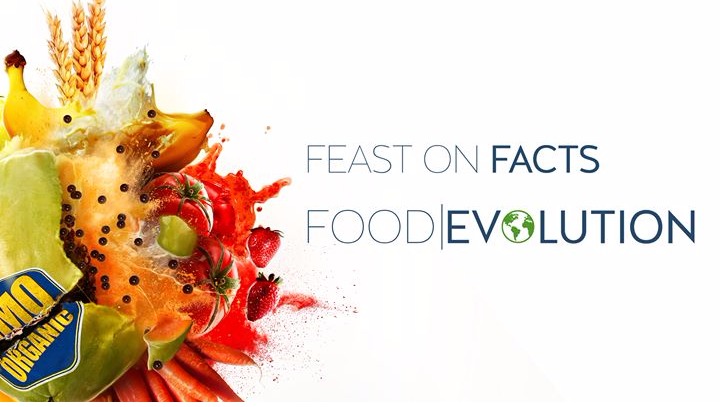
On October 11, 2017, Ag-West Bio partnered with Farm & Food Care Saskatchewan and SAIFood (U of S) to offer a free screening of Food Evolution at the Broadway Theatre. They followed up with a discussion panel, moderated by Clinton Monchuk, Executive Director of Farm & Food Care SK.
- Maurice Moloney, Executive Director of the Global Institute on Food Security
- Adam Malima, Chairperson of the Biotechnology Society in Tanzania
- Steve Shirtliffe, Professor, Department of Plant Sciences at the University of Saskatchewan
- Shannon Hood-Niefer, Vice President, Innovation and Technology, at the Sask Food Centre
An online survey was presented to the audience both before and after the film, asking the following questions:
1. Are you in any way involved in the agriculture industry?
2. On a scale of 1–10 what is your level of comfort in buying GMO foods?
As someone with affiliates on either side of this argument, I was fascinated to sit in a theatre filled with people divided on this contentious topic, and really listen to both the points in the movie and the questions raised by the panel and the audience. Did we move the dialogue further during that evening? And is there even a way to move the dialogue further with two camps so firmly entrenched in their positions?
Food Evolution was produced and directed by Scott Hamilton Kennedy, who is known for his unbiased analysis of difficult issues in documentaries. The filmmaking team is transparent about the independent nature of their relationship with their partners—the filmmakers were approached to do the movie by the Institute of Food Technologists (IFT) “to help them bring to life a documentary that would inform a fact-based public dialogue about our food system.” The film team was granted complete creative control and control over final cut before they agreed to do the film.
Although the IFT was nervous about focusing the movie on GMOs, arguing that it was too contentious a topic and would take away from the issues directly applicable to the IFT, the film team finally convinced them with a point that they also made very strongly in the film: GMOs have become a metaphor for our entire relationship with food.
Technology is moving quickly, and as journalist Nathanael Johnson of Grist says in the film, “corporate greed and bias has broken the public trust.” Citizens feel they have no control over much of what is happening in the world, and this is nowhere more immediately personal and emotionally charged than their feeling of control over what they put in their own mouths and feed their families.
The filmmakers chose to approach that conversation by starting with real life farmers. They present two case studies related to small scale agriculture: the papaya in Hawaii and bananas in Uganda. In the first case, city counsellors pass a law against GMOs and then rescind the ban when they realize farmers need the genetically-modified version in order to save their way of life.
We also learned of subsistence farmers in Uganda whose families subsist solely on bananas, which are succumbing to bacterial wilt disease (caused by Xanthomonas campestris pv. Musacearum bacteria). The farmers visit a nearby research facility, where a GMO banana has been developed that is resistant to bacterial wilt. However, the bananas were not accessible to the farmers, because regulations in Tanzania, Uganda and Kenya prevented the commercialization of GMOs. (Note: we were informed during the panel session that those laws had changed within a week of the screening).
It really hit home to hear a South African farmer explain how GMO crops improved his income so much that he could send his son to school. His message to the anti-GMO movement: “misinformation emerges in the rich world, and damages the poor world.” I left wondering how much of this level of reactivism around food in the anti-GMO movement is a first world luxury. How privileged are we in North America to be able to choose what we feed our families, in comparison to a family that has a single food staple that is at risk of being wiped out?
In the age of ‘alternate facts,’ in the midst of a veritable war on science, the erosion of the public trust appears even more potentially dangerous for progress and difficult to navigate. Public figures like Jeffrey Smith and ‘Food Babe’ (Vani Hari) have managed to claim authority in the area of food science without having any background in science, and in fact claim in the film that that they trust social media more than any scientific study.
Critics of the film may suggest they were represented negatively, but if these ‘experts’ are being brought in to hearings where major policy decisions and laws are being made, their flaunting of evidence and lack of credentials in that light is disturbing.
Other authorities were brought in as already converted to the support of GMOs as one of the tools in the global food toolbox. Former anti-GMO activist Mark Lynas speaks eloquently of his realization that to truly be in support of a greener planet, he needed to be on the other side of the argument. He now speaks in favour of GMOs. Michael Pollan, author of In Defense of Food: An Eater’s Manual and An Omnivore’s Dilemma, speaks out in defense of evidence-based decision making, which also translates to support for GMOs.
The film is narrated by astrophysicist and trusted pop icon Neil deGrasse Tyson and brings in another well-known name in popular science, Bill Nye the Science Guy. Nye attends a debate on GMOs, decides to look into the process further, and then publicly changes his anti-GMO stance. If trust is the major issue of this debate, it did well for the scientific community to gain the support of these well-known public figures.
The follow-up panel discussion continued the conversation with the audience. The panelists answered both thoughtfully and neutrally—or with transparent bias on either side of the issue. Most notably, Adam Malima made a strong statement that scientists are naïve at best, or arrogant at worst, for not refuting the false claims against the science before the movement became so strong.
Did the arguments in the film change the mind of the audience? The survey showed a slight move in that direction. While those in the agriculture industry began with and maintained a high level of confidence in GMO foods, there was an average shift toward more confidence in GMOs among non-agriculturalists by the end of the evening. Of the non-agriculturalists who participated in the survey, 58% remained unconvinced.
This conversation is far from over, and it left me wondering whether there can be any way for those who remain unconvinced to have a meaningful and open conversation about their concerns. When the issue isn’t evidence, but trust, how do we find the common ground among us? Scientists and citizens alike have similar concerns about the sustainability of our environment and food systems (and most of us know there is no separation of the two). I can’t hope to have the answers, but I for one will be looking for more ways to demonstrate that we are all pointing in the same direction. I look forward to more events like this to continue that conversation.
